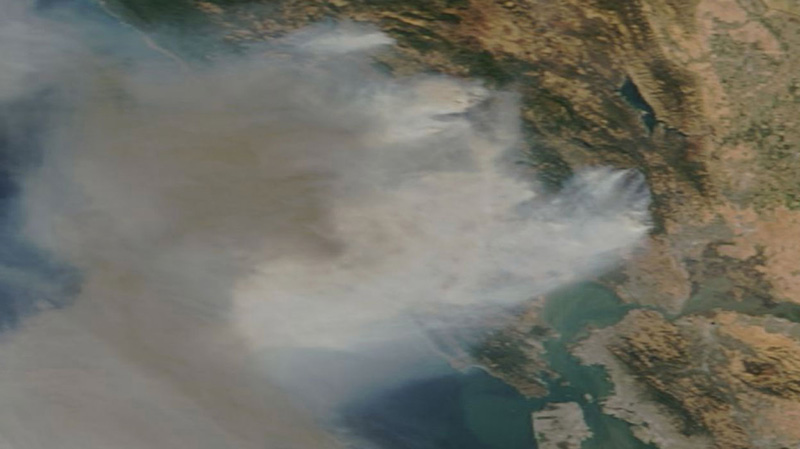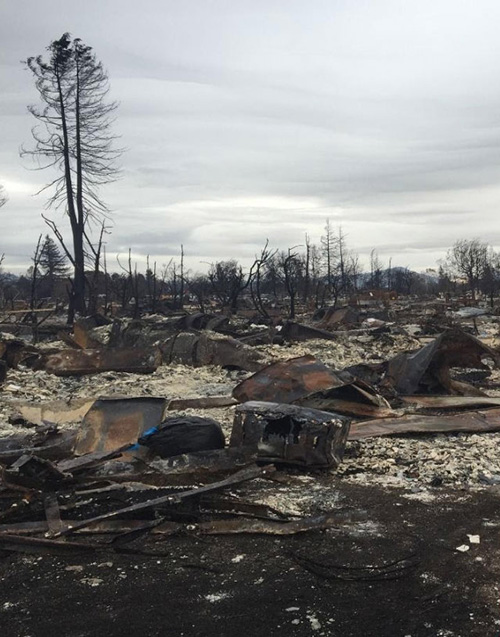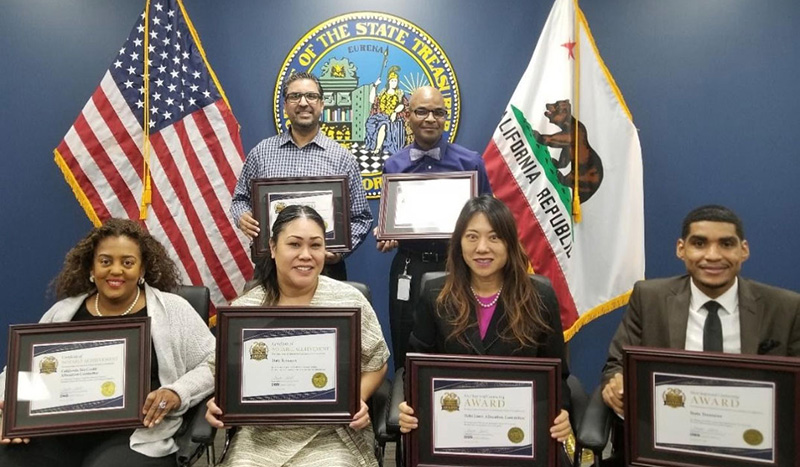March 2020 Articles
Newsletter Downloads
- March 2020
HTML version, PDF version - February 2020
HTML version, PDF version - January 2020
HTML version, PDF version - Year-End Highlights 2019
HTML version, PDF version
ABCs of the BCAs
March 2020
California Tax Credit Allocation Committee (CTCAC)

Tubbs Fire, October 9, 2017. Image by NASA - worldview.earthdata.nasa.gov, Public Domain, https://commons.wikimedia.org/w/index.php?curid=65317779.
$100 Million in Housing Tax Credits for Fire Disasters Now Available Through the California Tax Credit Allocation Committee
The California Tax Credit Allocation Committee (CTCAC), chaired by California State Treasurer Fiona Ma, is clarifying its regulations to make certain that 13 counties hit by fire disasters receive $100 million in new federal tax credits.
U.S. Representative Mike Thompson, D-Napa, authored legislation last year designed to provide additional tax credits to Butte, Lake, Los Angeles, Mendocino, Napa, Nevada, Orange, San Diego, Santa Barbara, Shasta, Sonoma, Ventura, and Yuba counties.
“We want to make it crystal clear that these tax credits are going to help counties that have been devastated by disasters,” Treasurer Ma said of the new credits. “I salute the resilience, dedication, and creativity of these communities and I’m glad we can help them rebuild.”
Each year CTCAC oversees the award of millions of dollars in federal and state tax credits that help stimulate the development of more affordable housing across the state. That is the committee’s primary purpose. In 2019, CTCAC awarded about $357.56 million in federal tax credits and $100.75 million in state tax credits, resulting in 21,311 housing units.
The new, additional tax credits are targeted to jumpstart housing developments in areas that in 2017 and 2018 suffered losses attributable to destructive wildfires, including the Camp Fire, the Tubbs Fire, the Thomas Fire, and the Mendocino Complex Fire.
State Senator Mike McGuire, D-Santa Rosa, thanked the Treasurer for her efforts. “This $100 million in tax credits will be a huge shot in the arm for the rebuilding of our communities and desperately needed affordable housing,” he said. “We’re incredibly grateful to Treasurer Ma for moving so fast and ensuring the tax credits will be spent as intended – in the 13 counties devastated by these massive wildfires.”

Santa Rosa’s Coffey Park neighborhood following the Tubbs Fire.
Rep. Thompson added, “It is critically important that our communities that have been hit hard by wildfires have all of the resources they need to rebuild and recover, which is why I carried legislation to provide $100 million in new federal tax credits to help create much needed affordable housing in disaster-stricken counties. I greatly appreciate Treasurer Ma’s commitment to ensuring that this assistance is allocated as Congress intended so that those displaced by wildfires can have access to affordable housing.”
In response to public comments, CTCAC is revising its regulations to give projects in the 13 counties two years to seek credits for housing. Under federal regulations the credits must be used within two years or they are lost. The new regulations allow projects seeking to house the homeless to apply for any unused credits at the end of 2021 to avoid losing them.
The revised regulations also would exempt communities hit by disaster from the typical nine percent tax credit rules, which reward projects located close to amenities such as shopping, libraries, and parks.
CTCAC is working to develop regulations to ensure that the disaster areas in large or more affluent counties are not given an unfair advantage over disaster areas in smaller counties or counties with fewer people.
Exceeding State Benchmarks

Treasurer Fiona Ma and staff proudly display contracting awards. Seated (left to right): CTCAC Executive Director Judith Blackwell, Chief of Staff Genevieve Jopanda, Treasurer Ma, Deputy Treasurer for Housing and Economic Development Jovan Agee. Standing (left to right): Business Services Manager Moulay Billouche, Senior Attorney Spencer Walker
The California Department of General Services (DGS) awarded the STO and two Boards, Commissions and Authorities (BCAs) overseen by Treasurer Fiona Ma certificates recognizing their successful efforts in exceeding or meeting state contracting benchmarks designed to encourage state agencies to do more business with California Small Businesses (SB), Micro Businesses (MB), and Disabled Veteran Business Enterprises (DVBE).
The STO and the California Tax Credit Allocation Committee (CTCAC) achieved a 30 percent or more SB participation and reached five percent or more DVBE participation, garnering “Notable Achievement” awards at the 20th Annual State Agency Recognition Awards. The state requires that agencies award at least 25 percent of their annual contracting dollars to SBs and MBs, and three percent to DVBEs.
Meanwhile, the STO, CTCAC, and the California Debt Limit Allocation Committee (CDLAC) made the largest increases in their SB or DVBE contract participation rates, receiving “Most Improved” awards.
Treasurer Ma applauded the awards, saying her mission is to include families and disabled veterans who own small enterprises in California’s prosperity.
The STO and BCAs awarded nearly $3 billion to certified small businesses and certified micro businesses through about 291 contracts in Fiscal Year 2018/19. In the same year, the STO and BCAs awarded $847,296 to certified disabled veteran business enterprises via about 163 contracts.
Note: Each month we will be sharing information on one of our BCAs and explain how the programs behind the acronym are enhancing the lives of Californians all across the state -- and how you, your family, or your business can share in, and contribute to, California's prosperity
CEFA News
The College Access Tax Credit Fund Application Period for 2020 is Now Open
The College Access Tax Credit Fund application period for the 2020 taxable year opened March 2, 2020. The fund administrator, the California Educational Facilities Authority (CEFA), provides a tax credit to individual taxpayers, businesses and insurance companies that contribute money to a fund that bolsters financial aid for California’s low-income college students.
The tax credit can offset or reduce state taxes borne by an individual, business or insurance company and may count as a charitable deduction for federal tax purposes. The amount of the tax credit is 50 percent of the amount of the cash contribution to the fund.
The application period for the 2020 taxable year runs through January 4, 2021 at 5 p.m. Applications are processed on a first come, first served basis. If tax credits are available CEFA will send the applicant a Notice of Allocation Reservation, as well as a Contribution Submittal Form. In order to receive a College Access Tax Credit Certification, an applicant must submit the cash contribution along with the Contribution Submittal Form within the required timeframe.
For assistance with an application or payment, please call (916) 654-5711.
CalSavers News
Reminder to Employers with More Than 100 Employees
CalSavers was created by legislation requiring California employers that do not sponsor a retirement plan and have at least five employees to participate in an automatic enrollment individual retirement account (IRA) with no employer fees or fiduciary liability. The first deadline is coming up June 30, 2020 for employers with over 100 employees. Employers can sign up at any time and savers can set up an account online or through the CalSavers mobile app.
Employer Assistance: (855) 650 - 6916
Employee Assistance: (855) 650 - 6918





